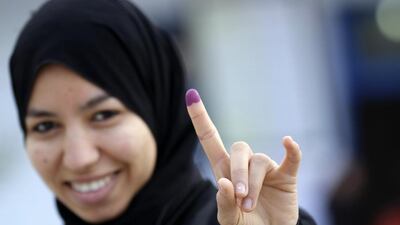TUNIS // Tunisians voted in the run-off of the country’s first free presidential election yesterday, following a predawn attack on soldiers guarding ballot papers.
Anti-Islamist Nidaa Tounes party chief Beji Caid Sebsi, 88, quickly claimed victory over incumbent Moncef Marzouki, whose camp dismissed the claim as unfounded.
After polls closed, Mr Caid Sebsi’s campaign manager said early indicators signalled his victory.
However, Mr Marzouki’s campaign chief Adnene Mancer said the result was too close to call, and accused the rival camp of election “violations”.
Official results could be announced as early as this evening.
Just hours before polling began at 8am local time, troops guarding papers in the central region of Kairouan came under attack. One assailant was shot dead and three others captured, said the defence ministry.
Prime minister Mehdi Jomaa condemned what he called a “desperate attempt” to disrupt the embrace of democracy in the country that triggered the Arab Spring.
It is the first time Tunisians have freely elected their president since independence from France in 1956.
Before the vote, which sets Tunisia apart from the turmoil of other Arab Spring countries, militants had issued a threat against the North African state’s political establishment.
Tens of thousands of soldiers and police were deployed to provide polling day security.
“I am proud to take part in this historic moment,” said Bechir Ghiloufi, a 54-year-old bank director in Tunis. “It is important to progress towards democracy.”
In the first round on November 23, Mr Caid Sebsi won 39 per cent of the vote, six points ahead of Mr Marzouki, a 69-year-old former rights activist installed by parliament two months after December 2011 polls.
Nidaa Tounes won parliamentary polls in October, making Mr Caid Sebsi favourite to be the next president, but with powers curbed under constitutional amendments to guard against a return to dictatorship.
Tunisia faces major economic challenges and there are fears of widespread joblessness causing social unrest.
* Agence France-Presse

